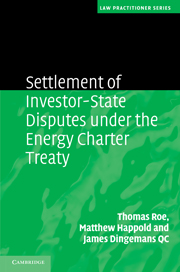Book contents
- Frontmatter
- Contents
- Foreword
- Preface
- Table of cases
- 1 Introduction
- 2 The applicable law
- 3 Availability of dispute settlement under Article 26
- 4 European Union law and the Energy Charter Treaty
- 5 Substantive law
- 6 Procedure
- 7 Contracting Parties' international responsibility for breaches of Part III of the ECT
- 8 Taxation
- Appendix A Selected provisions of the Energy Charter Treaty
- Appendix B Signatories to the Energy Charter Treaty
- Bibliography
- Index
8 - Taxation
Published online by Cambridge University Press: 05 July 2011
- Frontmatter
- Contents
- Foreword
- Preface
- Table of cases
- 1 Introduction
- 2 The applicable law
- 3 Availability of dispute settlement under Article 26
- 4 European Union law and the Energy Charter Treaty
- 5 Substantive law
- 6 Procedure
- 7 Contracting Parties' international responsibility for breaches of Part III of the ECT
- 8 Taxation
- Appendix A Selected provisions of the Energy Charter Treaty
- Appendix B Signatories to the Energy Charter Treaty
- Bibliography
- Index
Summary
Introduction
Tax regimes and levels of taxation are major concerns of investors, as they have direct and obvious effects on the profitability of their investments. The ECT, however, includes a major ‘carve out’ for taxation measures, taking them largely outside of the scope of the protections accorded by the Treaty. Such provisions are common in investment treaties. They are motivated, first, by a belief that taxation measures are more properly covered by bilateral tax conventions and, second and more fundamentally, by states' reluctance to abandon their fiscal prerogatives. Given, however, the use of taxation measures not only to raise revenue but also to regulate corporate behaviour and to promote a variety of social and political objectives – and their potential for abuse in order to ‘squeeze’ foreign investors – such exclusions have potentially far-reaching effects.
Part III of the ECT includes nothing specifically about taxation issues. Article 21 (Taxation), however, has rather a lot to say on the subject. Article 21 appears in Part IV of the Treaty and it will be recalled that, under Article 26, Investors can only bring claims for breach of obligations in Part III. However, despite its location, Article 21 affects Investors' rights under Article 26 because it serves to define the extent of the obligations which Contracting Parties incur in Part III. It is, however, a provision of Byzantine complexity.
Article 21(1) provides that:
Except as otherwise provided in this Article, nothing in this Treaty shall create rights or impose obligations with respect to Taxation Measures of the Contracting Parties. […]
- Type
- Chapter
- Information
- Publisher: Cambridge University PressPrint publication year: 2011

